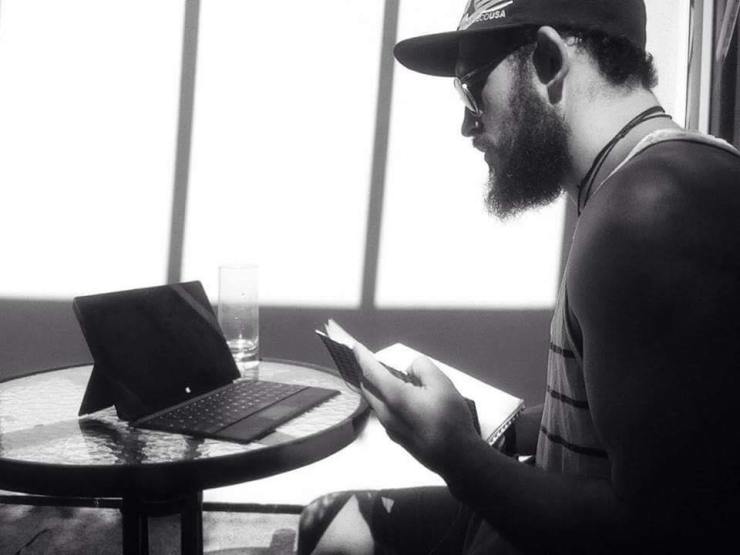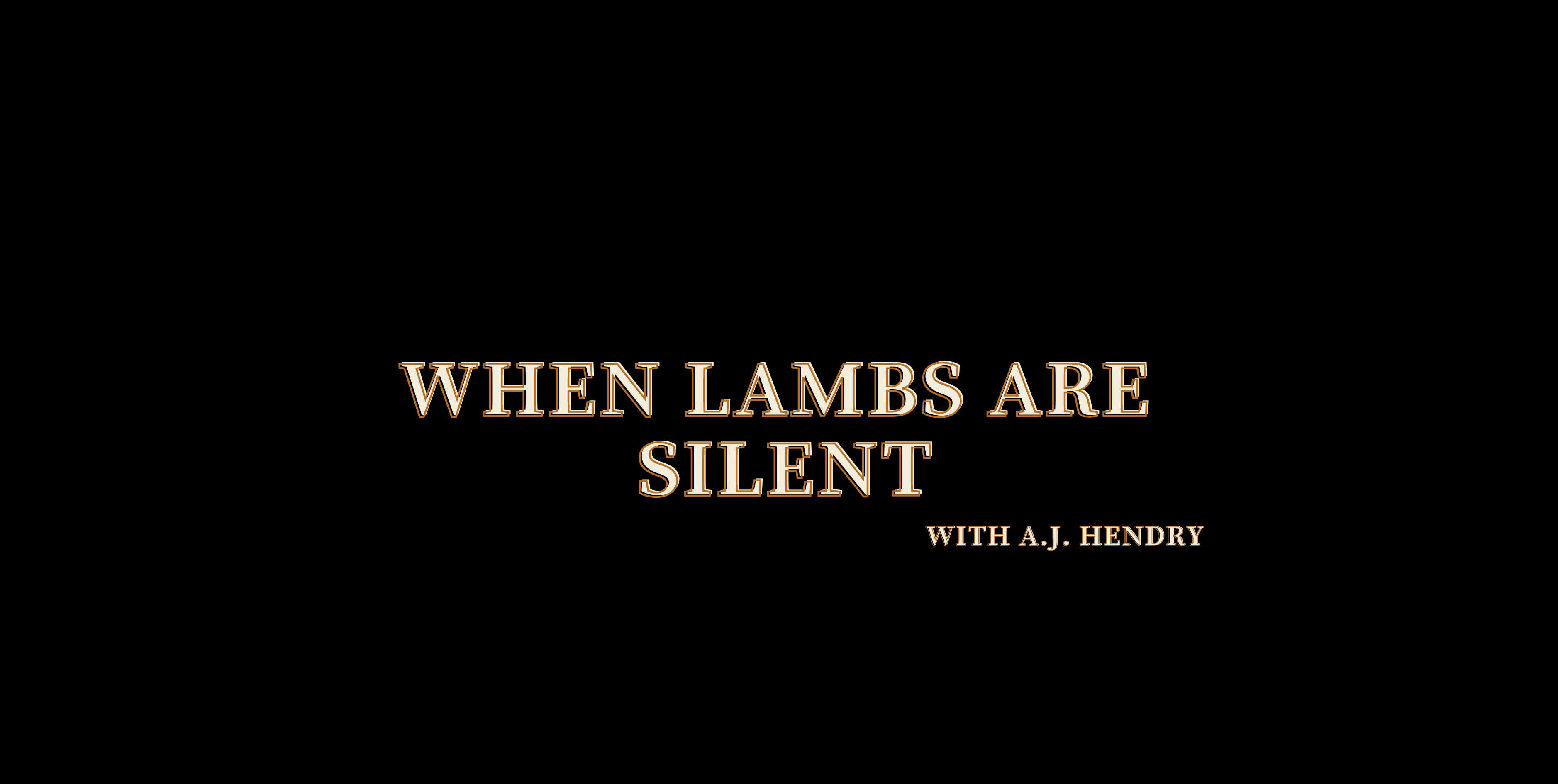
I was 8 the first time I remember wanting to end my life.
I was sitting in a tree overlooking the farm, it was a summer evening. I could feel the cool air biting my skin. Across the field, about 200 metres or so away I could hear the laughter of my siblings as they played some game back outside the house. And as the first golden rays of sun began to sink over the horizon, I considered whether I had the courage to run a knife through my chest.
Way back then, my little 8-year-old self had no way of understanding what I was experiencing.
I was in so much pain, and felt so, so alone.
I now know that the demon I was wrestling with was depression.
Depression.
The word for me had always carried connotations of weakness.
So when it finally got named for what it was… I denied it.
I am a man. And what’s more, I am a Hendry. And Hendry’s aren’t weak. We’re strong.
When we face obstacles in life, we don’t run away from them, we run through them, or we run over them.
I was going to beat this. If I chose not to accept it, then I would overcome it. I would use my strength…
But….
I couldn’t overcome it.
No matter how hard I tried, no matter how “strong” I attempted to be… it never went away.
This black stench of death never left me.
Sure, I learnt to endure it.
I survived.
But, that’s as good as it got.
Surviving.
I went through my childhood and much of my teens not even realizing how close to death I really was. It wasn’t until my early twenties at the beginning of my career as a Youth Worker when I came face to face with the realization of how dangerously close I’d played with the line between survival and insanity.
I was attending a workshop on suicide prevention when the facilitator took us through a list of the top 6 risk factors that highlighted how at risk someone was of dying from suicide.
The realization was chilling.
I ticked all six.
Thus, began a long, arduous battle towards healing and freedom. A battle which though I can proudly say that today I am winning, I also must admit I still have to fight.
But, why do I share this with you? Why have I opened my heart up and spilled its contents into the technological device you now hold?
It’s because there are people out there just like me. People who don’t even realize they are dying.
People who seem functional, and ok, who struggle to fit themselves into the box we’ve labelled as depression. People, who get up for work every day, smile, get crap done, and then when no one is watching break under the weight of depression’s suffocating force.
People who suffer silently and alone because they do not believe that their experience of depression is “severe enough” to label as such. Because, for some reason… they have learnt how to fake it in a way that others can’t.
I used to think that faking it, that ignoring it, that “being more than a conqueror”, was a sign of strength.
That those who “gave in” to depression were weak.
I was wrong
And it almost killed me.
It came from this idea that being a man meant that I had to be strong. That being a man meant not allowing myself to be brought low by something as silly and stupid as my feelings.
But, this concept of strength, this toxic masculinity is a cancer which has killed more people in this country than lung cancer or obesity ever will.
Men, whenever I hear discussion in this country that seeks to challenge patriarchal systems and address the frame works that allow toxic masculinity to thrive, too often it is men I see opposing such dialogue. As if fighting for the equality of all peoples would somehow lead to losing something of ourselves.
But, the reality is that when our sisters and mothers fight for an end to patriarchal systems, when they challenge narratives that allow toxic masculinity to thrive, they are not just fighting for themselves… whether they are aware of it or not… they are fighting for us as well.
When we participate in perpetuating the narrative that to be a man you must be tough, powerful, strong. When we use our privilege to dominate and control and point to that as an example of what it means to be man… We are committing ourselves to a way of being which has no room for what we label as weakness.
The result?
Well NZ’s suicide rate says it all.
Our culture’s stubborn persistence to hold on to this toxic conception of what it means to be a man is killing us.
For God’s sake, let us let the Patriarchy die.
I for one don’t want to see any one else die from depression because they were deceived. Deceived by a misconception of strength that prevented them from getting the help that they so desperately needed. Deceived by a lie that told them that being a man meant to dominate and control. That any sign of vulnerability was a sign of inferiority.
Being tough and macho does not make you a man.
Battling depression does not mean you are weak.
Admitting you can’t manage today doesn’t mean you aren’t strong.
The very fact that you are still alive proves to me that you are stronger than you know.
True strength is admitting when you need help.
It doesn’t matter if you think you should be able to get over it, that you should be able to beat this by yourself. Sometimes, the only way to overcome something is to move through it. To acknowledge its existence. To seek help. To be vulnerable.
Let go of the “shoulds”.
Reach out.
To a friend. A family member. Or one of the helplines I’ve listed below.
You are not alone.
You are strong enough to be vulnerable.
You do not have to suffer in silence.
Its ok not to be ok.
A.J Hendry
WHERE TO GET HELP
Lifeline (open 24/7) – 0800 543 354
Depression Helpline (open 24/7) – 0800 111 757
Healthline (open 24/7) – 0800 611 116
Samaritans (open 24/7) – 0800 726 666
Suicide Crisis Helpline (open 24/7) – 0508 828 865 (0508 TAUTOKO). This is a service for people who may be thinking about suicide, or those who are concerned about family or friends.
Youthline (open 24/7) – 0800 376 633. You can also text 234 for free between 8am and midnight, or email talk@youthline.co.nz
0800 WHATSUP children’s helpline – phone 0800 9428 787 between 1pm and 10pm on weekdays and from 3pm to 10pm on weekends. Online chat is available from 7pm to 10pm every day at www.whatsup.co.nz.
Kidsline (open 24/7) – 0800 543 754. This service is for children aged 5 to 18. Those who ring between 4pm and 9pm on weekdays will speak to a Kidsline buddy. These are specially trained teenage telephone counsellors.
Your local Rural Support Trust – 0800 787 254 (0800 RURAL HELP)
Alcohol Drug Helpline (open 24/7) – 0800 787 797. You can also text 8691 for free.
For further information, contact the Mental Health Foundation’s free Resource and Information Service (09 623 4812).

Dear Aaron, while I much appreciated your article (and the courage it took to post it publicly), I’m left with a few questions:
1. How does patriarchy and toxic masculinity make men weaker and more vulnerable? I believe it is so. I strongly believe it is so. It leaves men, women and children weaker and at a loss as to what is happening and why, generating confusion, anger, and alienation.
2. Where would you go to find a correct concept of masculinity and femininity? I believe this question must necessarily be answered. And the answer cannot be wishy-washy or based on personal feelings and experiences. The Bible has been used to promote patriarchy… and I believe we can and must find our answers in the Bible. Jesus is the One who showed compassion and gave liberating freedom to both men and women. Yes, we think Jesus freed women, but if we believe that, we need to realize that when freeing women, at the same time men are freed from the chains which are just the flipside of the same coin.
3. What can the church do to help at-risk-of-suicide men (and all men and women for that matter) to find their God-given identity? Sometimes, in a legitimate rush to affirm women we don’t realize we are downcasting men. And while we can no longer afford to lose women, we can’t afford to lose men either.
So yes, let’s let patriarchy die. Let’s give everyone the freedom to say “I need help”. Let’s let go of the shoulds. Let’s reach out. But let’s have a clear idea of why and how. Otherwise the feelings which prompt all this (totally legitimate and right) will not have the solid foundation to survive the battle which will certainly break out.
God bless you. Angela (another lamb that won’t be silent!)
LikeLiked by 1 person
Really great questions…. I have responded to some of these questions on FB, but point 2 I find really interesting.
You are so right, the Bible has been used to promote patriarchy in the past. And again, you are right it is vital that we rediscover what the Bible really says about Women, and Men and our relationship to each other. Personally, I believe that those who have used the Bible to undermine women and dominate them have done so by distorting and demeaning the Scriptures.
I also believe that when read through the Scriptures with the correct lens, and take into consideration context and culture, that the scriptures actually do the opposite. Instead of demeaning woman, they exalt them, reaffirming the humanity and equality of all human beings.
I’d actually be really interested in hearing your thoughts though? These are great questions, what is your perspective?
LikeLike
Hi Aaron, I’ve seen your answers on fb and thanks also for your above comments. I totally agree with you. I’m actually now studying the issue. I go to a church which teaches complementarity, which in my opinion is another name for patriarchy. And I see the damage it is doing. My heart bleeds. I’m now reading a most interesting book: “Man and woman, one in Christ;, an exegetical and theological study of Paul’s letters” by Philip B. Payne. I find it extremely well written and clear. I’m two thirds through. My hope is to be of help and support especially to women who are confused and hurt by patriarchy, as well as to take a stand when necessary to oppose this view in the church.
LikeLike
I’ll have to check it out. I’m totally with you. My heart breaks at the way the scriptures are used to devalue and demean woman. I think it damages and dehumanizes all of us. Good on you for advocating in your community on this. It can be hard, but if we are to be faithful in our service to Christ than it is i believe necessary to speak up and speak out. What has been the biggest take away from your book so far?
LikeLike
Dear A.J. Hendry,
I am grateful to and for every molecule that is you. Your sharing means more to me than words could ever possibly convey.
I. Appreciate. You.
The light in me recognizes, honors and bows to the light in you.
In peace,
L.J.
LikeLiked by 1 person
Thank you LJ, NGA mihi. A.H
LikeLike
Reblogged this on Swift Ape Poetry and commented:
The truth
LikeLiked by 1 person